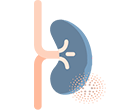Tetti, M., Monticone, S., Burrello, J., Matarazzo, P., Veglio, F., Pasini, B., Jeunemaitre, X., & Mulatero, P. (2018). Liddle Syndrome: Review of the Literature and Description of a New Case. International journal of molecular sciences, 19(3), 812. https://doi.org/10.3390/ijms19030812
Enslow, B. T., Stockand, J. D., & Berman, J. M. (2019). Liddle’s syndrome mechanisms, diagnosis and management. Integrated blood pressure control, 12, 13–22. https://doi.org/10.2147/IBPC.S188869
Warnock D. G. (2001). Liddle syndrome: genetics and mechanisms of Na+ channel defects. The American journal of the medical sciences, 322(6), 302–307. https://doi.org/10.1097/00000441-200112000-00002
Yang, K. Q., Xiao, Y., Tian, T., Gao, L. G., & Zhou, X. L. (2014). Molecular genetics of Liddle’s syndrome. Clinica chimica acta; international journal of clinical chemistry, 436, 202–206. https://doi.org/10.1016/j.cca.2014.05.015
Cui, Y., Tong, A., Jiang, J., Wang, F., & Li, C. (2017). Liddle syndrome: clinical and genetic profiles. Journal of clinical hypertension (Greenwich, Conn.), 19(5), 524–529. https://doi.org/10.1111/jch.12949





